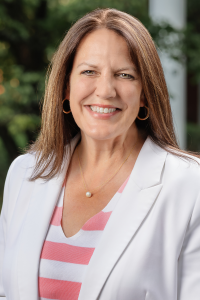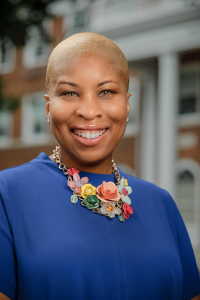
Connie Ledoux Book
Connie Ledoux Book is a passionate advocate for higher education and its power to transform students’ lives. She spent 16 years as an Elon faculty member and administrative leader, helping to build the university’s reputation for excellence in engaged teaching and learning. In 2015 she accepted a groundbreaking role as the first female provost and chief academic officer at The Citadel. Following her impressive accomplishments there, she returned to Elon as president in 2018, bringing a deep appreciation for the university’s unique history and its rapid rise to national prominence.
Under President Book’s leadership, Elon launched the ambitious 10-year Boldly Elon strategic plan to advance the university’s national leadership in experiential education, mentoring and student success. Elon has been reclassified as a Doctoral/Professional institution, ranked as a top-100 National University and named by Princeton Review as the nation’s “Best Run” university. President Book has shepherded the hiring of numerous new full-time faculty members and the initiation of innovative new academic programs in engineering and nursing and numerous new facilities. With her leadership, Elon opened the Innovation Quad, with two new buildings providing more than 55,000 square feet for engaged learning in engineering and sciences.
President Book has provided leadership for new investments in health and wellness and the creation of Health EU — the university’s holistic wellness initiative. President Book established the new Division of Inclusive Excellence to direct progress on diversity and equity, expanded professional development for faculty and staff, and continues to implement lifelong learning opportunities for alumni.
President Book also provided important leadership for the successful $260 million Elon LEADS comprehensive fundraising campaign, which has added more than 275 endowed scholarships, eight new facilities and increased resources for people and programs across the university. With President Book’s strategic vision, Elon has set a bold course for the future.

Buffie Longmire-Avital
Buffie Longmire-Avital is a diversity, inclusion and racial equity (D.I.R.E ©) scholar-educator. In academic year 2021-22 she became the first Black-identified faculty member promoted to the rank of professor in the Elon College, the College of Arts & Sciences at Elon University. Longmire-Avital is a member of the psychology department, the founding director of the Black Lumen Project, an equity initiative, and is currently serving as the Faculty Administrative Fellow for Mentoring in Meaningful Relationships. She previously served as the coordinator of the African and African American Studies interdisciplinary minor program for six years.
Longmire-Avital received her Ph.D. in Applied Developmental Psychology from New York University’s Steinhardt School of Culture, Education, and Human Development. For nearly two decades her research has focused on how systemic injustices in combination with various psychosocial factors contribute to health inequities that impact racial and sexual minorities. Through a critical community health frame, her primary research explores how the adoption of high effort coping responses (e.g., strong Black woman, hyper vigilance) in response to chronic minority status stressors (e.g., daily encounters with discrimination, microaggressions, racism, poverty) play a part in the development of unhealthy lifestyle behaviors (e.g., high risk sexual encounters, emotional eating) and mental health outcomes for young collegiate adults. Longmire-Avital’s secondary research examines how to create virtual interventions tailored for Black American women living with chronic health conditions, such as a diagnosis of HIV or those who have adopted high effort coping responses (e.g., strong Black woman) prioritize well-being, increase self-care and self-compassionate beliefs.
She has received both internal and external funding awards to support her ongoing health inequities research throughout her career. In 2023 she was one of 11 scholars awarded a fellowship through the Race, Religion, and American Judaism Project. The initiative, which explores the ways Jewish parents talk about race and racism with their children was a funded through the Center for Jewish Ethics and the National Endowment for the Humanities.
Longmire-Avital has published numerous articles and served on the editorial boards of multiple academic journals. As the Center for Engaged Learning (CEL) Scholar from 2018–20 she wrote widely read CEL blogs focused on how to generate and sustain critically conscious, equitable approaches that support underserved and often invisible students’ engagement in High Impact Practices through critically informed reparative mentorship. She recently served as one of four scholars tasked with revising the Characteristics for Excellence in Undergraduate Research guiding framework from The Council of Undergraduate Research.
Longmire-Avital has received numerous awards in recognition of her excellence in mentorship as well as leadership service. She is also a recipient of the prestigious National Institutes of Health, Loan Repayment Program for Health Disparities, and a National Research Service Award.
Speakers
David joined Bringing Theory to Practice as Director in July 2018, following the retirement of Don Harward. For 20 years, he has worked to advance the democratic purposes of higher education, especially through the integration of public engagement with liberal education and the inclusion of underserved students.
From 1989 to 2005, he taught American Studies, U.S. cultural history and architecture at the University of Michigan; in 1998, he founded UM Arts of Citizenship program, which fostered public work and community projects in the arts, humanities and design. He has served as director of the Harward Center for Community Partnerships at Bates College (2005-10), the inaugural executive dean of the School for Public Engagement at The New School in New York City (2010-14) and senior scholar for The Graduate! Network, which supports college access and success for adult learners (2014-18).
He has a Ph.D. in American Studies from Yale University and is the author of “Empire City: The Making and Meaning of the New York City Landscape” (Temple University Press, 2002), as well as other studies of U.S. cultural and urban history. He also writes extensively on the recent history of and current issues in higher education.
With a career spanning over two decades, Rebecca Kohn is an accomplished scholar and researcher and a catalyst for positive change in higher education. In early 2023 Kohn began serving as provost and vice president of academic affairs at Elon University, where she supports the university’s focus on the student experience, including substantial participation in study abroad. Her professional trajectory was shaped as an undergraduate at Dartmouth College, where she majored in biochemistry and studied Russian language, spending a semester abroad in the Soviet Union. Additionally, she works in tandem with the Division of Student Life to ensure a holistic approach to students’ experiences both inside and outside of the classroom.
After earning a Ph.D. in biology at the Johns Hopkins University and completing a postdoctoral fellowship, she became a biology professor at Ursinus College. As a faculty member, Kohn actively engaged students in her research lab, fostering an inclusive and experiential education. Her global perspective was further enriched through a Fulbright Fellowship in Chile. Transitioning into administrative roles, she championed institution-wide programs enhancing student learning and success.
Kohn transitioned to administrative roles to contribute to innovative programming on an institution-wide scale. She served as senior associate dean of the college at Ursinus College and senior vice provost and dean of the College of Arts and Sciences at Arcadia University. She was drawn to Elon University by its outstanding national reputation for prioritizing the student experience and fostering innovation. Thrilled to be part of a forward-moving community, she eagerly supports the talented students who enroll at Elon as they embark on their transformative journeys into the broader world.
Leo M. Lambert is a professor and president emeritus of Elon University, where he served as president from 1999-2018. During his tenure as president, Lambert led two, 10-year strategic plans for the campus that propelled Elon from a regional college to a nationally-recognized university. A chapter of Phi Beta Kappa, the oldest and most prestigious academic honor society in the U.S., was established at Elon in 2010 following major investments in arts and sciences programs, world languages, honors and support for faculty scholarship. Elon’s professional schools of business, law, health sciences, communications and education also achieved top accreditations and distinctions during his presidency. Today Elon is recognized widely for excellence in experiential learning, including its programs in study abroad, undergraduate research, civic engagement and interfaith cooperation. More than 100 buildings were added to Elon’s campus during Lambert’s presidency.
Among other writings, Lambert is the co-author of the books “The Undergraduate Experience: Focusing Institutions on What Matters Most” (Jossey-Bass, 2016), “Relationship-Rich Education: How Human Connections Drive Success in College” (Johns Hopkins University Press, 2020) and “Connections Are Everything: A College Student’s Guide to Relationship-Rich Education” (Johns Hopkins University Press, 2023). A recognized leader in higher education, Lambert currently serves on the John N. Gardner Institute for Excellence in Undergraduate Education and has previously served on the boards of the Association of Governing Boards, The Washington Center, the American Council on Education, the Association of American Colleges and Universities, and the National Association of Independent Colleges and Universities. He is also a senior fellow for religious pluralism for the Aspen Institute’s Inclusive America Project and the Interfaith Youth Core. In 2009, he received the inaugural William M. Burke Presidential Award for Excellence in Experiential Education from the National Society for Experiential Education. Lambert holds honorary doctoral degrees in humane letters from his alma mater, SUNY Geneseo, and Jacksonville University.
Peter Felten is professor of history, executive director of the Center for Engaged Learning, and assistant provost for teaching and learning at Elon University. During the 2022-23 academic year, he was named Fulbright Canada Distinguished Chair in the Scholarship of Teaching and Learning at Carleton University in Ottawa. Felten has published six books about undergraduate education, including (with Leo Lambert) “Relationship-Rich Education: How Human Connections Drive Success in College” (Johns Hopkins University Press, 2020). His next book, a student guide to relationship-rich education, is co-authored with Isis Artze-Vega, Leo Lambert and Oscar Miranda Tapia, was published by Johns Hopkins in 2023 (with an open access online version free to all readers). He has served as president of the International Society for the Scholarship of Teaching and Learning and also of the POD Network, the U.S. professional society for educational developers. He is on the advisory board of the National Survey of Student Engagement and is a fellow of the Gardner Institute, a foundation that works to advance equity, justice and upward social mobility through higher education.
Panelists
Entertainment




